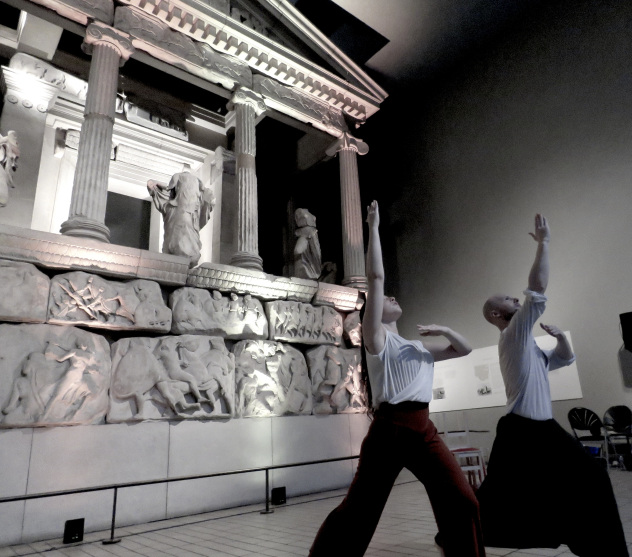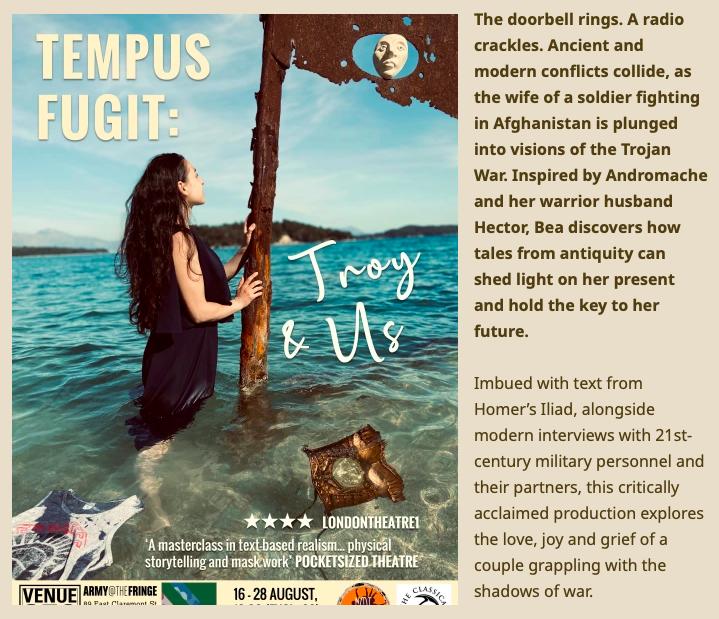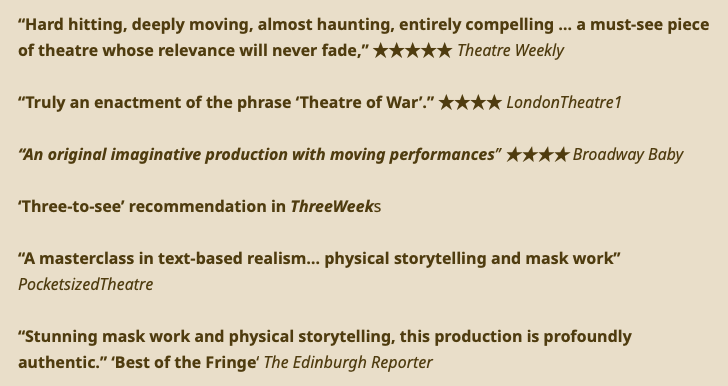Tempus Fugit: Troy and Us

During the Summer of 2019, professional theatre company NMT Automatics visited St Andrews University. They were developing their new show, Tempus Fugit: Troy and Us, in collaboration with The Centre for the Public Understanding of Greek and Roman Drama, and were introduced to Dr Alice König and the Visualising War project in the process. The conversations that followed led them to re-shape the line of enquiry in their theatrical enterprise and to ‘apply’ Classics in new ways, to unsettle contemporary assumptions about heroism, gender, military life/culture and established habits of visualising and dramatising war.
NMT Automatics has a long history of adapting Classical myths for modern audiences, always with a view to using antiquity to speak to modern issues or challenges. Their Dido & Aeneas Remixed adapted parts of Virgil’s Aeneid to engage young performers and modern audiences in a storytelling experience that asked important questions about migration, hostility to ‘others’, and the power of compassion. And their Pandora’s Box put that age-old myth under the microscope as a way of exploring perceptions of and attitudes to women down the centuries. Co-founders Jennie Dunne and Jonathan D’Young have run masterclasses with students taking our ‘Modern Classics’ module to share their wide experience of doing ‘Applied Classics’ via drama.
Re-visualising War via Andromache and Hectore

NMT Automatics’ collaboration with the Visualising War project began as simple ‘research-and-development exercise for their new show, Tempus Fugit. They were keen to discuss what themes they might foreground, how best to dramatise military life on stage, and how to use ancient narratives to prompt audiences into rethinking preconceived ideas of battle and war. This led them to experiment with different ways of deploying Classics to address modern challenges; and they ended up delivering a series of workshops and performances that engaged with other theatre-makers, military personnel, and the wider public. A range of ‘Applied Classics’ activities cascaded out of their original venture.
Their original idea for the play was to bring the story of Hector and Andromache into dialogue with the experiences of a modern military couple, to shine new light on the tensions, anxiety, disruption and sacrifice that military service entails for all parties. They experimented with all sorts of ways of highlighting parallels while making meaning out of differences between the ancient and modern narratives. Interestingly, as their use of the ancient story shifted, so did their emphasis on modern realities. In particular, they moved from dramatising war from a male perspective to a focus primarily on what women go through.
During early ‘drafts’ of the play, the ancient myth was woven in and out of the plot to offer a fresh ‘lens’ on modern experiences; however, as the NMT Automatics team developed the show, Hector and Andromache’s tale became a way of reflecting not only the realities of modern warfare but also the fantasies and misconceptions we often have about it. Using the ancient tale in this way helps audiences to question and critique established habits of visualising war, and it also reminds us where some of those habits have come from. As NMT Automatics co-founder Jonathan D’Young explained:
Where we have previously sought to entertain and inspire with our productions, Dr König’s research has awakened us to the fact that any type of war narrative presented to a general public, feeds and perpetuates expectations of warfare that can be both dangerous and incredulous. Her research has given us an impetus to explore the way we, as performers, can break cyclical habits of visualisation, and impact a general public in a way which edifies their acuity in regards to war… She has really pushed us to query why and how we are presenting these tales, to search for the meaning behind a story, and to ask ourselves what we are trying to say, or do, with a show that deals in ancient myths – how we can affect or impact an audience, and how we can bring about change via theatre.
Jonathan D’Young, NMT Automatics
Tempus Fugit: Troy and Us was premiered at the British Museum’s ‘Troy’ Exhibition in 2020. Following further development, it was performed again at the Redbridge Drama Centre (2021), before a month-long run at Army@TheFringe (Edinburgh Fringe Festival) in August 2022. Post-show talks have helped to extend the ‘Applied Classics’ nature of the project, and reviews and audience responses have been hugely positive. You can read some reviews below, and listen to the NMT Automatics Team in conversation on the Visualising War podcast below.
